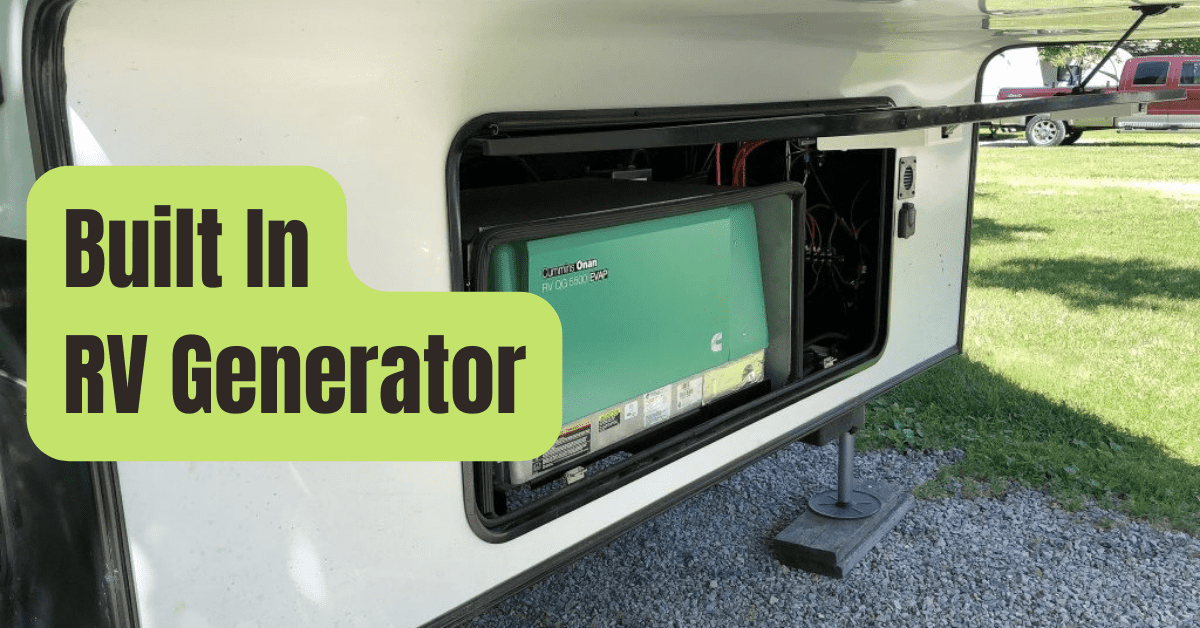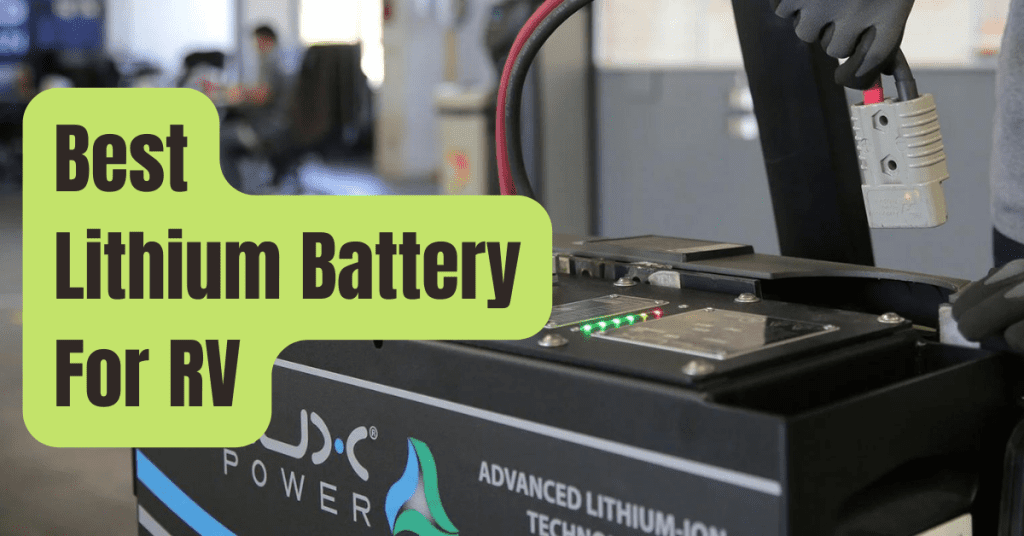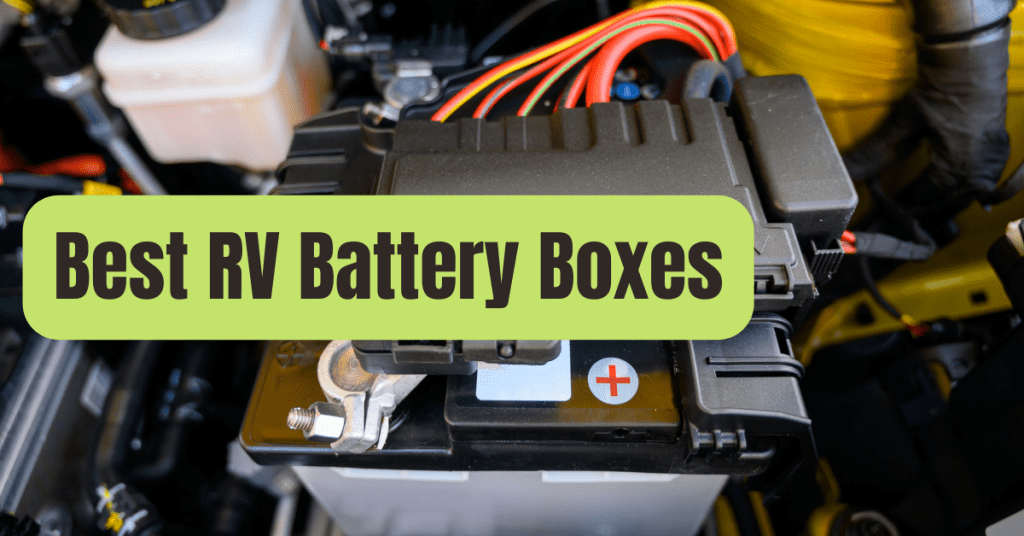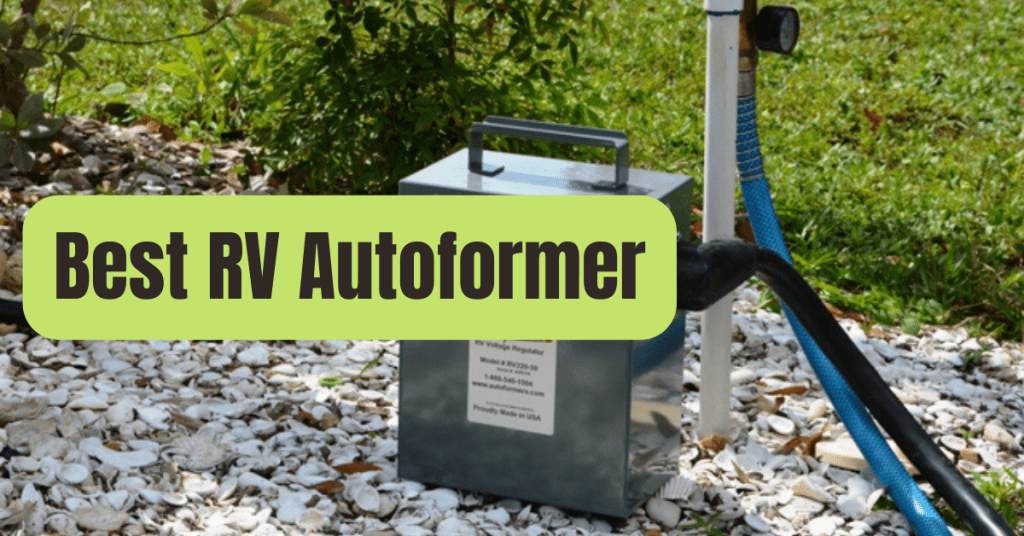It’s thrilling to shop for a new recreational vehicle (RV).
Comparing the characteristics…
Imagining the journeys you’ll take…
Sharing your thoughts with family and friends…
Today’s RVs, whether they’re luxurious motor coaches or basic campers, come with a plethora of utilities like as stoves, freezers, and air conditioning.
It’s a long way from the days when RV campers just had a few lights powered by a coach battery.
An electric generator is required to power all of these contemporary conveniences.
This might be a built-in RV generator or a standard camping portable generator.
We’ll go over why you need an RV generator, the many varieties, and how to choose the right one for your vehicle in our RV generator buyer’s guide.

Is a Generator Required for My RV?
If you invested a lot of money on a motor coach RV with all those fancy electrical equipment, you’re wasting your money if you don’t obtain an RV generator.
You may be able to get by without a powerful generator if you have a tiny, towable camper or travel trailer, but you might still benefit from some basic backup power.
On-site electricity is available at many campgrounds, but not all.
If you’re going off the usual route with your RV, you won’t be able to rely on shore electricity.
Invest in a generator to ensure your independence.
The first step in selecting an RV generator is to differentiate between built-in and portable generators.
Portable vs. Built-in RV generators
A built-in RV generator is the ideal alternative if your RV or camper has a built-in generator compartment.
This hardwired camper generator is powered by the battery and is hooked to your vehicle’s electrical system.
There’s no need to fill up a separate gasoline tank during a wet night since fuel flows directly from your RV.
RV generators are generally high-powered, with at least 3,000 watts of electricity.
Because they come with push-button start from within the car, there is no need for a manual setup.
If you’re camping at high heights, such as the Rockies, several models can adapt performance to altitude.
Built-in generators are definitely preferable for individuals with a big Class A or Class C motor coach, since a tiny portable generator won’t be able to handle all you need to power.
Yes, you can plug in a huge, open-frame portable unit, but they are incredibly noisy and weigh hundreds of pounds.
Built-in generators have the disadvantage of being difficult to access, maintain, and repair.
They also sit within your RV, and even though they exhaust outdoors, a CO alarm should be installed in case of malfunction.
Additionally, while using one, keep your windows closed to avoid exhaust from seeping back inside.
Because portable generators are located several feet away from your RV and can be readily accessible and maintained, they alleviate these concerns.
Nonetheless, because of their lower power and manual operation, they are better suited to smaller Class B RVs or towable campers that do not have their own fuel supply.
The major distinctions between built-in and portable generators are summarized in the chart below:
| BUILT-IN RV GENERATORS | PORTABLE RV GENERATORS |
|---|---|
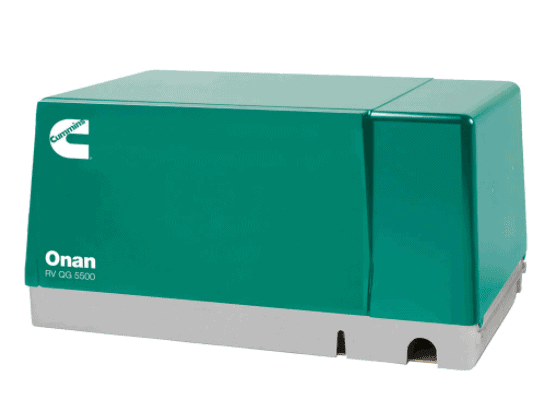 |  |
| Integrated/Wired into RV | Connected from Outside |
| Automatic Setup, Push-button Start | Manual Setup/Start |
| Up to 12,000+ Watts of Power | Up to 8,000+ Watts of Power |
| Uses RV’s fuel tank | Requires separate fuel tank |
| Difficult to Access/Maintain | Simple Access/Maintenance |
| Higher Risk of Exhaust Leaks | Lower Risk of Exhaust Leaks |
| Typically Costs More | Typically Less Expensive |
The most crucial step, whether you pick a built-in RV generator or a portable RV generator, is to size it right.

What Generator Size Do I Require for My RV?
You must determine both the physical dimensions and the electrical output of an RV generator in order to size it.
1. Confirm that your generator will fit inside your RV.
Take measurements in the compartment of your RV generator to ensure that you get the right one.
2. Figure out how much electricity you’ll require.
Add up the beginning wattage needs of all the appliances you’ll be using at the same time.
The total is the wattage that is required.
The greatest power is required to operate your air conditioner, which has a larger beginning wattage need than running wattage.
As a result, the number of air conditioners in your RV is critical in estimating your power requirements.
Read our post on how to power an RV air conditioner for additional details.
Here’s a rundown of typical appliances and their wattages:

Assume you wish to use an air conditioner, a coffee maker, a microwave, a light, and a water pump all at the same time.
You can reach 5,900 watts by adding the top ranges of the wattages on the chart.
At the very least, any generator will have to deal with it.
Use our portable generator size calculator to get an estimate of how many watts you’ll need.
You should increase your maximum load by roughly 20%.
As a result, your machine will not be subjected to the abuse of continuous operation at full power.
You’d need at least a 7,000-watt generator in our scenario.
Consider adding additional things to your estimates if you believe you’ll need them in the future.
Some people wonder if a generator should be sized for a 50-amp RV or a 30-amp RV.
That is the incorrect approach.
A 50-amp RV needs a 12,000-watt 240-volt generator and a 6,000-watt 120-volt generator to power everything.
It’s possible that your RV lacks the physical room to accommodate such a powerful generator.
That’s why you should always start with physical dimensions and then sum up wattages to determine how much power you truly require at any given moment.
Type of Fuel Used in RV Generators
RV generators are powered by gasoline, diesel, or propane.
You should match the fuel type of your generator to that of your RV.
In most circumstances, your RV’s built-in generator will draw gasoline straight from the tank until it’s down to a quarter tank (to prevent accidentally going empty).
A liquid propane generator is an option for towable campers without their own fuel supply.
Otherwise, choose the gasoline that is most cost-effective in your area.
If you go with a portable generator, you’ll have more alternatives, including dual-fuel generators that can switch between gasoline and propane.
Keep in mind that portable generators need an external gasoline tank, which you must maintain.
RV generator owners should be aware of several important federal rules, which we’ll go over in the following section.
EPA Regulations for Gas RV Generators
Gas fumes created within the tanks of built-in RV generators must be caught and sent to be burnt, according to the Environmental Protection Agency (EPA).
As a result, EVAP generators that are specifically developed to fulfill these criteria are now available.
Most motorized RVs are equipped with a system that conforms with these rules, but most tow-behinds do not.
An EVAP generator, approved hose, unique fittings, a specially built metal tank, and a carbon canister are required for towable RVs.
If any of these authorized EVAP components are missing from your built-in system, you’ll face a large fine if you’re stopped and examined.
Unless your gas RV generator gets its fuel from the chassis fuel tank, you’ll want to be sure you’re following the rules on the road to avoid a hefty fine.

Take Advantage Of The Great Outdoors.
At the end of the day, pick an RV generator that will meet your demands while not interfering with the enjoyment of your vacation.
Focus on enjoying the beautiful outdoors and turning each day into an adventure.
If you need more assistance picking an RV generator, give us a call at (800) 800-3317 and speak with one of our experts.

